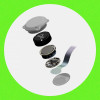Bionic Eyes Benefit the Blind
Gaze deeply into his eyes and a silicon chip calmly stares back at you.
More than just the stuff that $6 million men are made of, several types of "bionic eyes" are beginning to make their presence felt in the area where they are most needed -- restoring sight to the blind.
Earlier this year, three people were successfully implanted with a permanent "retinal prosthesis" by researchers at the Keck School of Medicine of the University of Southern California. Each patient wore spectacles with miniature video cameras that transmitted signals to a 4-mm-by-5-mm retinal implant via a wireless receiver embedded behind the ear.
The device works by transmitting visual signals captured by the video camera to the retinal implant, which contains an array of 16 electrodes. The signal is then recreated by stimulating the remaining healthy retinal cells with the electrodes, which pass on the information to the brain through the optic nerve.
Dr. Mark Humayun, professor of ophthalmology at the Keck School, said the first target population would be those who had had sight once and then lost it due to certain types of blindness such as retinitis pigmentosa or age-related macular degeneration.
"If successful in these patients, then the device will be evaluated for use in other types of blindnesses, such as those blind from birth," Humayun said.
Test results so far have revealed that some patients were capable of detecting when a light was turned on or off, describing the motion of an object and counting discrete objects. The capability to recognize faces or read large print is thought to be possible only with 1,000 or more electrodes, however.
Australian researcher Nigel Lovell, from the University of New South Wales, is working on an implant with 100 electrodes, which he hopes will give patients the ability to differentiate between night and day, detect obstacles and provide some rudimentary reading skills. "100 channels is near the practical limit," said Lovell. "There are ways around these limits, but it's not the most important question at present."









































































